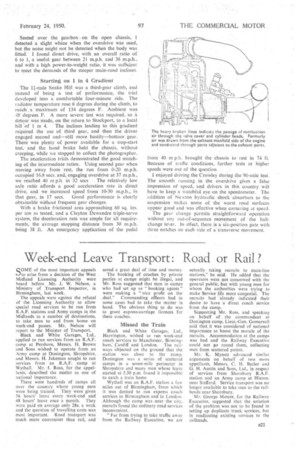Week-end Leave Transport: Road or Rail ?
Page 55

If you've noticed an error in this article please click here to report it so we can fix it.
QOM E of the most important appeals to arise from a decision of the West Midland Licensing Authority were heard before Mr. I. W. Nelson, a Ministry of Transport Inspector, in Birmingham, last week.
The appeals were against the refusal of • the Licensing Authority to allow special road services to be run from R.A.F. stations and Army camps in the Midlands to a number of destinations, to take men to and from home on week-end passes. Mr. Nelson will report to the Minister of Transport.
Black and White Garages, Ltd., applied to run services from an R.A.F. camp at Pershore, Messrs. H. Brown and Sons wished to operate from an Army camp at Darlington, Shropshire, and Messrs. H. Jakeman sought to run services from an R.A.F. camp at Wythall. Mr. .J. Ross, for the appellants, described the matter as one of national importance.
There were hundreds of camps all over the country where young men were being trained. They were given 36 hours' leave every week-end and 48 hours' leave once a month. They were paid on average only 28s. a week and the question of travelling costs was most important. Road transport was much more convenient than rail, and saved a great deal of time and money.
The booking of coaches by private parties at camps might be illegal, and Mr. Ross suggested that men in camps who had set up as "booking agents" were making a "nice profit on the deal." Commanding officers had in some cases had to take the matter in hand. The obvious thing to do was to grant express-carriage licences for these coaches.
Missed the Train Black and White Garages, Ltd., Harvington, wished to run week-end coach services to Manchester, Birmingham: Cardiff and London. The railways objected on the ground that the station was close to the camp. Donington was a series of scattered camps in a seVen-mile perimeter in Shropshire and many men whose leave started at 5.30 p.m. found it impossible to catch a train home Wythall was an R.A.F. station a few miles out of Birmingham, from which it was desired to run express coach services to Birmingham and to London. Although the camp was near the city-, recruits found the ordinary road services inconvenient.
"Far from trying to take traffic away from the Railway Executive, we are
actually taking recruits to main-tine stations," he said. He added -that the operators were not concerned with the general public,but with young men for whom the authorities were trying to make Service life more congenial. The recruits had already indicated their desire to have a direct coach service from the camp.
Supporting Mr. Ross. and speaking on behalf .of the commandant at Donington camp, Lieut.-Gen. Gomersall said that it was considered of national importance to boost the morale of the recruits. Accommodation at the camps was bad and the Railway Executive could not go round them, collecting men from scattered points.
Mr. K. Mynett advanced similar arguments on behalf of two more appellants, Messrs. C. H. Butler and G. H. Austin and Sons, Ltd., in respect of services . from Shorehury station and an Army camp at Hixton, near Stafford. Service transport was no longer available to take men to the railheads near Shorebury.
-Mr. George Mercer, for the Railway Executive, suggested that the solution of the problem was not to be found in setting up duplicate trunk services, but in readjusting existing services to the railheads.




































































































